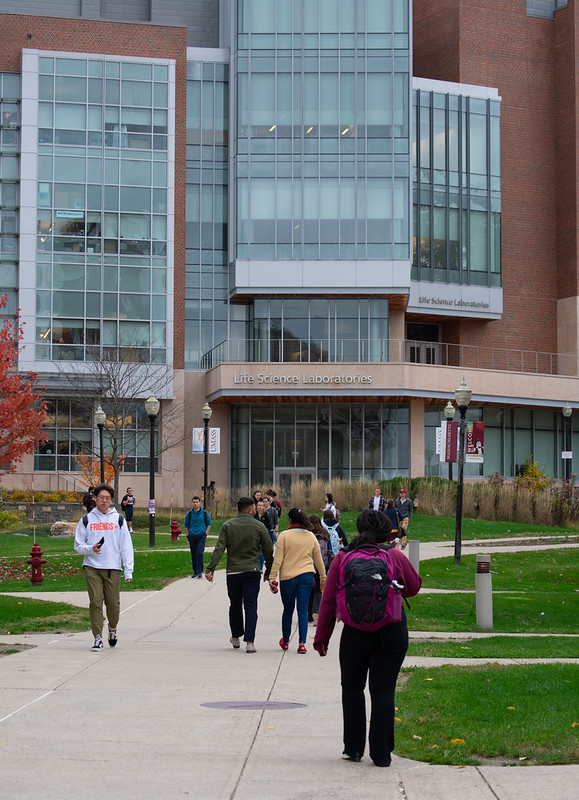College admissions season is approaching, with this year’s high school students gearing up to ready their applications. Students applying to the University of Massachusetts during this cycle, however, may be doing so without one of the most recognizable sections of the portfolios of all college hopefuls: the SAT and ACT.
Recently, UMass announced the adoption of a test-optional admissions policy for the next three years due to concerns about testing safely as a result of COVID-19. The decision may not be temporary though, as UMass and other universities have been facing increased pressure to completely remove the requirement for standardized testing.
Many argue using standardized tests as a measure of future success is antiquated and rooted in the dismissal of economically disadvantaged and marginalized students. Criticism of these standardized tests is not new, with even the ACT itself recognizing a direct correlation between the average ACT composite score and family income. Families with the resources to pay for expensive test preparation services and students with the time to spend studying for these tests are offered a clear leg up above other students, making the tests less about merit and more about how many resources one’s parents have.
It is easy to claim standardized testing is the main culprit for economic discrimination within the college admission process. That could not be further from the truth, however, as the admissions process to gain the highly coveted access to higher education is at its core an exercise in class. According to data analyzed by Richard Reeves and Joanna Venator of the Brookings Institution, there is a strong correlation between the level of education achieved by people’s fathers and their own educational attainment. These numbers run contrary to the popular narrative of college, and higher education as a whole, as some great equalizer.
In popular media and more, college is often framed as an opportunity for lower-income students to climb the social ladder and advance into a new world replete with lucrative job opportunities. This often-venerated myth purports that any student with academic merit can overcome the limitations imposed on them by their socioeconomic status to launch themselves into a better future. Colleges themselves feed into this, highlighting their need-blind admission choices and financial aid offers as paving an equal path for prospective students, regardless of class.
Need-blind admission, a feature which not all colleges offer, can only do so much, considering how at every single facet of the process the absurd edge higher-income students have is clear. Students with economic privilege have the luxury of investing time in unpaid extracurricular activities to pad their applications, offering them the ability to embody the ideal of that well-rounded student colleges seem to be looking for. They are able to volunteer for significant amounts of time and take advantage of unpaid internships—a major source of experience many students use as evidence of their passion for and knowledge of their desired field. As Dereck Thompson of The Atlantic argues, these internships are something only those with wealthy parents can afford to work in, as money needs to be negligible for those who want to work nine-to-five without receiving any compensation in return. Someone who has to work to save money for college would logistically be barred from participating in the same internship, placing them at a disadvantaged position from the very start. All of this does not even take into account the test-preparation and essay review services wealthy parents are able to secure for their children. Considering these gross advantages, it becomes impossible to claim that admissions are simply a question of merit and not economic privilege.
Making standardized testing optional for students is certainly an important first step towards ensuring an equitable chance for all students to access higher education, regardless of their background. It is only a start though, and colleges everywhere need to put more effort into considering the effect income has on students’ applications, as well as taking that into consideration in order to ensure everyone has a fair chance.
Srija Nagireddy is a Collegian contributor and can be reached at [email protected].





















Student • Aug 31, 2020 at 5:21 pm
People forget that the original intent of standardized testing for college admissions was to help students who come from unprivileged backgrounds prove their ability to succeed in college. Before the SAT, admissions were much more determined by wealth, race, and family background. A 228-report from the University of California[1], completed in Jan. 2020, found that standardized tests are not discriminatory. On the contrary, they combat the worsening problem of high school grade inflation, which is particularly happening at wealthy high schools. Without standardized tests, we’re left with high school grades and “soft” criteria which are ripe for discrimination. You can’t (legally) fudge a number on a test, and they’re strongly correlated with college success. You have to make the admissions decision somehow—why throw away the most accurate tool we have?
The correlation between ACT score and income that you linked to is just that, a correlation—not a determination. Why not simply control for family income when calculating an applicant’s score, instead of throwing out the whole thing?
[1] https://senate.universityofcalifornia.edu/_files/underreview/sttf-report.pdf?mod=article_inline